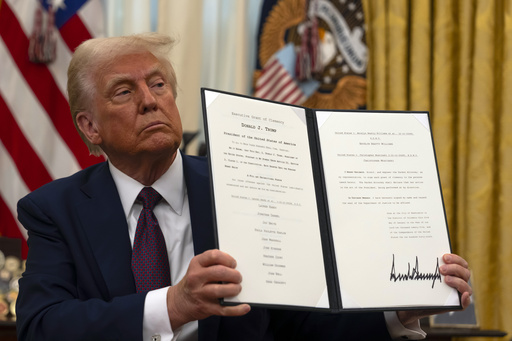
Christianity remains the predominant faith in the United States, with conservative Christian groups wielding considerable influence over government actions. This dominance raises questions about the necessity of President Trump’s newly assembled task force aimed at combating perceived anti-Christian bias. Critics argue that the initiative is unnecessary and geared towards appeasing Trump’s support base, while some Christian advocates assert that it is a long-overdue response to discrimination they believe they faced under the Biden administration.
The two-year task force, led by Attorney General Pam Bondi and including various Cabinet members and other governmental figures, is responsible for investigating and identifying any unlawful anti-Christian actions that may have occurred during Biden’s term. Their mandate entails altering any contentious policies and suggesting measures to rectify previous oversights.
A critical perspective comes from Bruce Ledewitz, a law professor at Duquesne University in Pittsburgh, who contends that this executive order reflects a powerful group expressing a sense of victimhood. Despite the Christian conservative movement, a foundational Republican faction, holding substantial authority in the Supreme Court and other government branches, Ledewitz points out their claims of victimization.
He describes the ongoing conflict as a deep cultural struggle where conservatives assert that they, unlike Democrats, are inherently more religious. Trump echoed these sentiments at a National Prayer Breakfast early in February, suggesting that his opponents actively oppose religion and God, alleging that the previous administration engaged in persecution.
In contrast, Ryan Bangert, a senior vice president at the conservative legal organization Alliance Defending Freedom, argues that the task force is indeed warranted. He claims that discriminatory policies targeting Christian values on issues like abortion and gender were systematically imposed by the Biden administration. Bangert stresses that these beliefs are not unique to Christians but are also held by other religious communities.
Nevertheless, some critics question whether the instances of alleged discrimination presented by Trump illustrate a broader pattern. For example, during his speech at the prayer breakfast, Trump referenced a woman who was imprisoned for her protests against abortion. He inaccurately described her situation, which arose from her involvement in blockading an abortion clinic, as a case of persecution simply for praying.
Bangert defended the actions of the Biden administration by stating that it has excessively enforced the Freedom of Access to Clinic Entrances (FACE) Act against anti-abortion advocates while neglecting to protect Churches and pregnancy centers that have been targeted following the Supreme Court’s decision in 2022 to overturn Roe v. Wade. He noted a disparity in the enforcement of the Act against protesters advocating for life compared to those who vandalized facilities providing alternatives to abortion.
The U.S. Conference of Catholic Bishops expressed its support for the creation of the task force, voicing optimism about efforts to address anti-Christian sentiment and affirming its readiness to share insights to ensure the full exercise of religious freedom for all. The conference has been documenting numerous incidents, noting over 366 cases of vandalism, attacks on churches, and related events since 2020.
Trump’s executive order also alleged that Biden’s administration attempted to impose radical transgender ideologies on Christians and to marginalize Christians within the foster-care system. Moreover, he claimed that in 2023, the FBI identified traditional Catholics as potential domestic terrorism threats, suggesting against the backdrop of a specific criminal case involving an individual with violent intentions.
Additional controversy arose when Biden proclaimed March 31, 2024, as “Transgender Day of Visibility,” coinciding with Easter Sunday that year—prompting backlash from conservative Christians who see such incidents as insensitive.
While U.S. administrations have previously focused on specific religions, such as creating strategies to combat antisemitism and Islamophobia, some secular groups, like the Freedom From Religion Foundation, criticized the new task force, arguing that governmental roles should encompass rights broadly rather than favoring one particular faith.
Ledewitz pointed out that while the task force may not technically violate constitutional bans on religious establishment, it risks promoting Christianity in practice, which could conflict with the Establishment Clause. Citing recent Supreme Court decisions, he emphasized that government should avoid displaying hostility towards any religious belief.
Yet, he argues that there is insufficient evidence to suggest that Christians in the U.S. face systemic persecution. Although the share of religiously unaffiliated individuals has increased, Christians still constitute nearly two-thirds of the American populace.
Matthew Taylor, a scholar at the Institute for Islamic, Christian and Jewish Studies, expressed concern over the task force. His recent book discusses how fervent supporters of Trump, often charismatic leaders, contribute to the notion of Christian persecution. Taylor stated that in a predominantly Christian nation, claims of anti-Christian bias seem exaggerated and that such narratives can sometimes incite hostility toward minority groups.
In summary, the task force established to investigate anti-Christian bias in government policies is generating polarized opinions amid an ongoing cultural debate about religion’s role in the public sphere.

